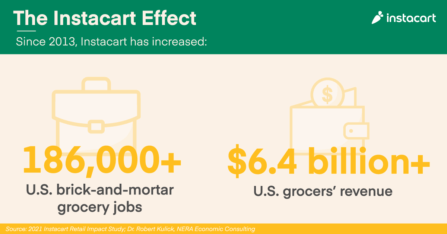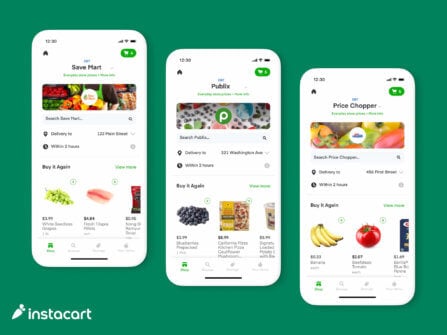Company Updates
From Insight to Impact: Instacart Supports New Research on Food Access and Nutrition Security

We believe that every person deserves access to nutritious food, regardless of their economic background or zipcode. Today, we’re proud to share the publication of a special issue of the Journal of Healthcare for the Poor and Underserved (JHCPU), in collaboration with Meharry Medical College – one of the nation’s foremost historically Black medical colleges. The issue includes new research that examines food access, nutrition security, and health outcomes shining a light on the unique barriers faced by marginalized communities, Black and Hispanic households, urban and rural communities, and families living with low incomes.
Our partnership with Meharry Medical College reflects Instacart’s ongoing commitment to advancing research and evidence-based approaches to addressing food access and nutrition security. By sponsoring this supplemental issue and making our Instacart Health technology available to researchers, we’re contributing directly to a body of work that tackles persistent inequities in food and health systems and explores innovative solutions that can create lasting change.
The studies featured in this issue of JHCPU investigate three core areas:
- Challenges in Food Access and Individual Preferences – identifying specific obstacles that communities face in obtaining healthy, affordable food.
- The Role of Clinical Settings – exploring how healthcare environments can bridge food access gaps, especially for vulnerable populations.
- Community-Based Nutrition Programs – examining the impact of initiatives like food pantries and nutrition incentives that aim to make healthy foods more accessible.
“This collection stands out for its wide representation of populations and for contributions to the measurement of food insecurity, chronic disease and food insecurity, primary care-based food assistance, food pantries, and addressing food insecurity during the pandemic. We’re proud to have worked with Instacart to publish this issue, and look forward to this supplemental issue making an impact in the research community and beyond,” said Virginia M. Brennan, PhD, MA, Editor-in-Chief, JHCPU, Meharry Medical College.
Research explores the real, day-to-day challenges many underserved populations face when it comes to food and nutrition security and highlights how tailored interventions can support healthier communities. The issue brings together a diverse array of studies, using both quantitative and qualitative methods, that offer new insights into the lives of people facing food insecurity and the innovative ways communities and organizations are responding. Featured papers cover a range of topics, and key studies include:
- Caregivers and Food Insecurity – A University of Pennsylvania study shows that caregivers, especially those using pediatric clinics, often view these clinics as trusted sources for food assistance. However, barriers such as transportation and time constraints prevent some from accessing traditional food pantries. This research underscores the need for accessible grocery delivery services, like those offered through Instacart, to help families overcome these obstacles and access healthy food more easily.
- Food Pantries as Health Partners – Researchers from Northwestern University Feinberg School of Medicine explore the role of community food pantries in serving individuals with chronic conditions, including diabetes, hypertension, and allergies. The study found that food pantries could better support clients by offering healthier options that meet specific dietary needs. This approach empowers individuals to make informed choices and reinforces the dignity and agency of those who rely on these resources.
- Youth and Food Security – During the pandemic, the Youth Food Security Network in Baltimore, Maryland launched an online Youth Food Pantry, which, with support from Instacart, provided direct food delivery to young people in need. This innovative model reduced barriers such as transportation challenges and stigma while allowing youth to personalize their food preferences—a key step in creating services that genuinely resonate with younger populations.
Through this collaboration with Meharry Medical College and the JHCPU, Instacart is helping amplify valuable insights and solutions that can inform policymakers, healthcare providers, and community organizations as they work to address food insecurity. Our commitment to this work reflects our broader mission to make nutritious food accessible for everyone.
We invite you to explore all of the research in the full issue here.
Most Recent in Company Updates

Company Updates
Ordering Groceries With an AI Agent, Like OpenAI’s Operator
Instacart Continues to Drive the Future of AI, Leaning Into Agentic Tools If you’ve ever wished someone else would order your groceries–and you’re an OpenAI ChatGPT Pro subscriber–you’re in luck. With the introduction of AI-powered…
Jan 23, 2025
Company Updates
Instacart Launches Community Carts for 10 Los Angeles-based YMCAs, Unlocking Crowdsourced Donations for Victims of the LA Wildfires
As wildfires continue to sweep through Los Angeles County, we know that connecting temporary emergency relief centers helping care for tens of thousands of people to the much-needed groceries and supplies they need is more…
Jan 12, 2025
Company Updates
Helping the people of Los Angeles with access to fresh groceries and essentials
We are devastated by the effects of the wildfires sweeping through Los Angeles, impacting tens of thousands of people who have lost their homes, have been forced to evacuate, or are on call to evacuate…
Jan 9, 2025

 Instacart’s Impact on America’s Grocery Industry, by the Numbers
Instacart’s Impact on America’s Grocery Industry, by the Numbers  Breaking Down Barriers to Food Access with EBT SNAP Expansion
Breaking Down Barriers to Food Access with EBT SNAP Expansion  Beyond the Cart: A Year of Essential Stories
Beyond the Cart: A Year of Essential Stories  A Hot Take on America’s Favorite Hot Sauces 🌶
A Hot Take on America’s Favorite Hot Sauces 🌶  JuJu Smith-Schuster: What’s in my Cart?
JuJu Smith-Schuster: What’s in my Cart?  Introducing the First-Ever Instacart Emerging Brand List
Introducing the First-Ever Instacart Emerging Brand List 
